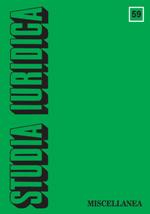Occupatio jako sposób nabycia własności dziko żyjących zwierząt w prawie rzymskim
Occupatio as Mode of Acquisition of Wild Animals in Roman Law
Author(s): Zuzanna BenincasaSubject(s): Law, Constitution, Jurisprudence
Published by: Wydawnictwa Uniwersytetu Warszawskiego
Keywords: prawo; nauki prawne; teoria i praktyka prawa; law; legal science; theory and pratcical law
Summary/Abstract: The paper discusses the legal questions concerning occupatio as a way of acquiring the ownership of wild animals (ferae bestiae) in Roman law. According to the fundamental principle of ius gentium, wild animals were the property of no one (res nullius) and could be captured by anyone, at which point they became the property of the captor whether captured on his own land or somebody else’s. Thus, the animal captured was deemed to be the property of the captor as long as it remained under his control (custodia). As soon as a wild animal has escaped from the control (custodiam evadere) recovering natural liberty (libertas naturalis), it became res nullius again and belonged to the first person who subsequently caught it. The problems discussed by the Roman jurists focused, first of all, on determining the moment in which a captor acquired the property of a wild animal: whether it became the property of a hunter as a result of having been severely wounded and prosecuted by him, or if it was necessary to actually capture it. The Roman jurists also considered the question of a wild animal caught in a trap. The other issue elaborated by classical jurisprudence was the concept of custodia as a guaranty of keeping ownership of a wild animal and the related concept of natural liberty as a state opposite to custodia, in which a wild animal preserved the status of res nullius and thus could be captured by anyone. According to the evidence given by legal texts, the concept of custodia was interpreted very widely as a possibility to control a wild animal. It referred not only to wild animals kept enclosed, but also to the tame ones (mansuetae) that live in their natural environment but preserved a habit of returning to their owners (consuetudo revertendi). The attention that classical jurisprudence paid to the question of acquiring the property of wild animals indirectly shows that at the end of the republic the profits from hunting and fishing became a conspicuous source of revenue for Roman landowners so they tended to keep to themselves the exclusive right to hunt on their land.
Journal: Studia Iuridica
- Issue Year: 2014
- Issue No: 59
- Page Range: 9-39
- Page Count: 31
- Language: Polish

